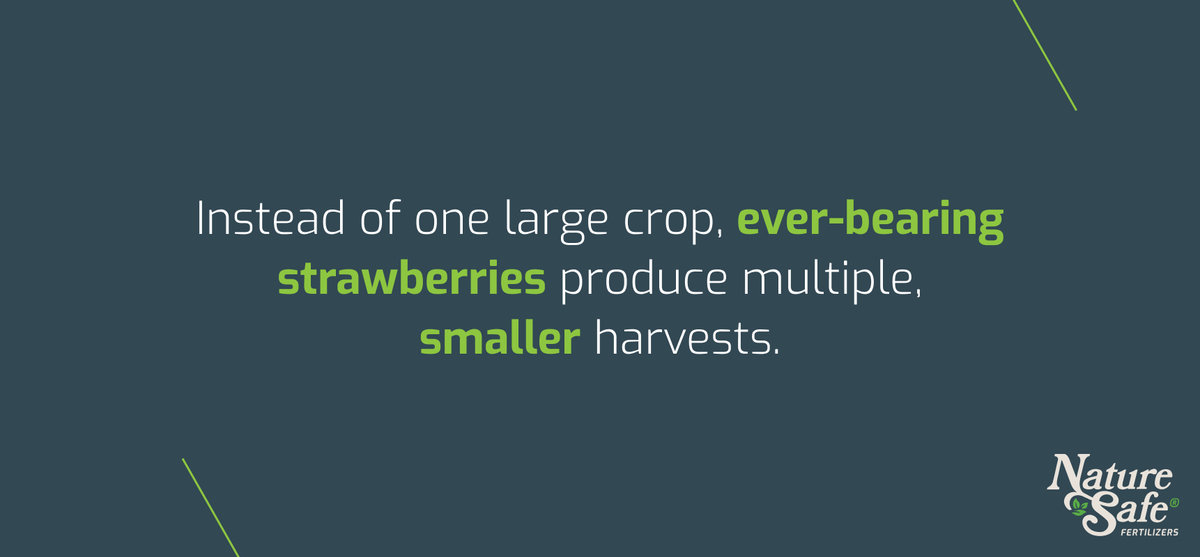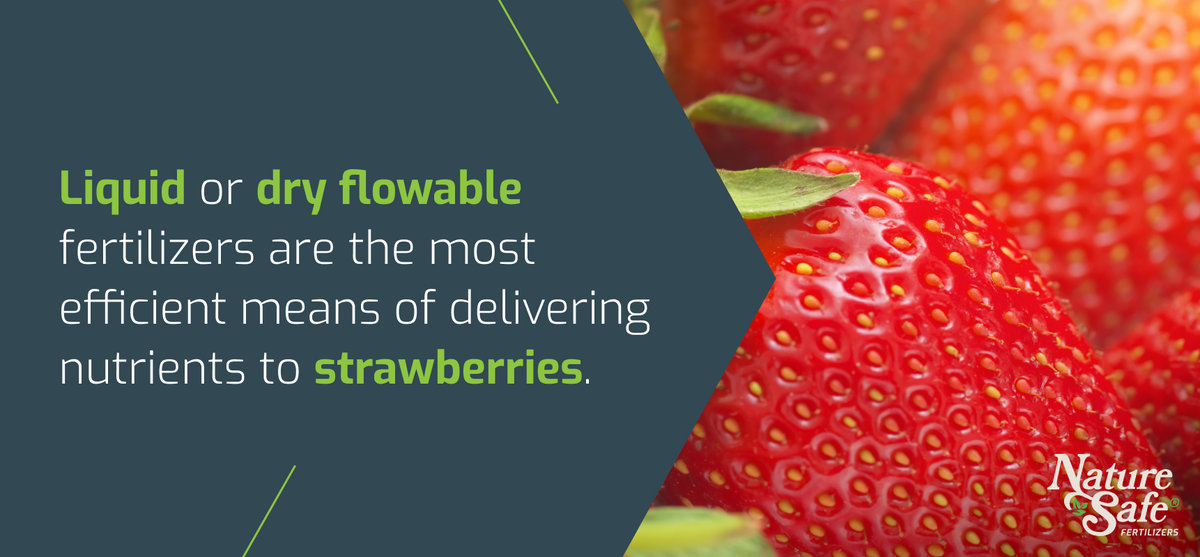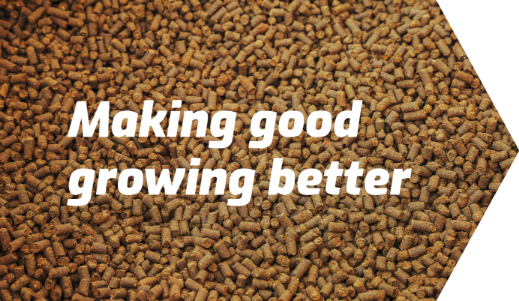
The Best Organic Fertilizer for Strawberries
- Posted: Nov 03, 2022
- Author: Nature Safe Fertilizers
- Crop
Few delights say “summertime” quite as cheerily as red, ripe strawberries. While they grow “like weeds” in some parts of the United States, growing the best organic strawberries takes some agricultural skill.
Whether you’re just beginning your strawberry farming journey, or you’re a seasoned grower on strawberry farms, we’re here to help you find the best organic fertilizer for strawberries.
Which Strawberry Varieties Are You Planting?
The hardiness of the region you’re growing in will likely determine the species of strawberry you choose to grow. Strawberries are also grouped by varieties, determined by when they produce fruit.
June-Bearing
June or “early-bearing” strawberries are the big plump ones that are found in the supermarket. These are generally planted in late spring and early summer for harvest the next summer.
June-bearing strawberries are set apart from the other varieties due to their massive, once-a-year harvest. A crop of June-bearing strawberries will produce fruit each year sometime between June and August. Each crop yields 8,000-12,000 pounds of strawberries per acre.
Some of the most popular, versatile species of June-bearing strawberries are Tillamook, Northeaster, and Earliglow.
Ever-Bearing
Instead of one large crop, ever-bearing strawberries produce multiple, smaller harvests. These are very popular with home gardeners.
While their harvests can still happen during the summer growing season, ever-bearing strawberries can start to fruit anytime after the spring equinox in June.

Day Neutral
Day neutral strawberries are also harvested multiple times during the summer. They typically produce smaller berries than June-bearing during their fruiting periods, which include early-June, mid-July, and late-August.
Because these produce abundant fruit through multiple harvests, they can yield up to 20,000 pounds per acre by the end of summer.
Strawberry Crop Nutritional Needs
Each varietal and species of strawberry has roughly the same nutritional needs. Growers can either test the soil or the leaves of mature strawberry plants to see if they are lacking any nutrients. Based on these results, they’ll need to adjust their fertilization approach.
Strawberries are often happiest with consistent, moderate watering via drip hoses in or on the ground of each row. This makes liquid organic fertilizers easy to apply by watering through fertigation systems.
While all of the “Big Three” nutrients (Nitrogen, Phosphorus, and Potassium) are important to healthy strawberry growth, they should be applied—especially early on—with intentional proportions and mindful timing.
Phosphorus and Potassium
Particularly for June-bearing strawberries, phosphorus and potassium should be applied liberally when planting.
Both of these nutrients are essential in fighting disease and for root and stem growth. Phosphorus in particular promotes fruit development. These nutrients stay in the plant and soil long after fertilization. Thus, once the plant matures, they should be applied as-needed and determined by leaf and soil testing.
Nitrogen
Nitrogen is considered the most important of the Big Three, and is usually applied heavily during early growth. It promotes leaf growth, so strawberries don’t need much right off the bat.
The University of Minnesota Extension recommends adding half of the amount of nitrogen needed just before planting. Then the other half should be added in late August when the plants begin to develop “runners,” or “daughter plants.” Strawberries in organic soil need roughly 25 pounds of nitrogen per acre in total.
The most effective way of doing this is to use a balanced fertilizer at planting, and nitrogen-rich fertilizer at the end of summer. Each year after that, using a nitrogen-rich fertilizer after harvest is best practice.
Be careful with adding nitrogen. Too much means too much leaf and runner growth and not enough—or even poor quality—fruit. Again, soil and leaf testing can help determine the crop’s needs.
Other Strawberry Farming Considerations
Organic fertilizer creates healthy soil for your current crop and everything planted afterwards. Using it in tandem with other sound agricultural practices to create healthy soil will ensure that your crop is as healthy and profitable as it can be.
Soil Composition
In addition to nitrogen, phosphorus, and potassium, other vitamins and minerals that are important to overall plant health include calcium, magnesium, and carbon.
Plant nutrition goes beyond just the mineral profile of the soil—the pH of it plays a significant role as well. Strawberries prefer slightly acidic soil, in the range of about 5.3 to 6.5 on the pH scale.
Strawberries also thrive in sandy loam soil that is well-drained and full of organic matter. Green manuring is one method to add organic matter to soil to boost its overall health.
Consistent watering
Strawberry farming usually involves drip hoses down each row of crops for moderate watering. Strawberries don’t need much watering, but they also do not tolerate drought well.
Watering practices are nearly as important as nutrition. According to planting research from UMN extension, most small yields of strawberries are due to bad watering practices.
Weed Management
Though strawberry bushes like to spread out wide, they don’t do well against other weeds. While home gardeners have the ability to hand-pick weeds, commercial farmers have to use other methods to control weeds and pests.
Cover crops are a tried-and-true method of natural weed suppression and pest control. Cover crops (like clover) not only increase nitrogen levels in the soil, but they take up space so weeds can’t grow and impede on the cash crop.
Choosing the Best Organic Fertilizer for Strawberries
We believe that the best fertilizer for strawberries is organic. At Nature Safe, we’re dedicated to creating quality organic products that are effective and safe for strawberry farms.
Because strawberries do best with consistent watering through drip hoses, liquid or dry flowable fertilizers are the most efficient means of delivering nutrients to the crop.
Our top picks of organic fertilizers for strawberry farms are dry flowable or “water soluble fertilizers.” They can be easily dissolved in water and added to a fertigation system.

Dry Flowable 7-7-7
This balanced dry flowable fertilizer is perfect for the fertilization that happens before strawberries are planted. It can provide young plants with all of the nitrogen, phosphorus, and potassium that they need in the earliest growing stages.
Because this product is water-soluble, it can be easily dissolved and spread through a fertigation system. Nature Safe’s controlled release formula ensures an even distribution of nutrients with limited leaching.
Dry Flowable 15-0-1
Another dry flowable organic fertilizer, this nitrogen-rich formula is recommended for fertilization at the end of summer after planting and following years after harvest.
All crops need nitrogen for leaf growth. Strawberries benefit from nitrogen-rich fertilizers as they mature as it helps them spread runners and create space for extra fruit growth.
Nature Safe Organic Fertilizer For Vibrant Strawberry Farms
Strawberry farming doesn’t have to be a difficult process. Nature Safe is here to help you find the best organic fertilizer for strawberries on farms across the United States. Our organic formulas are made of plant- and animal- based ingredients, leaving out harmful chemicals and fillers.
Together, we can make good growing better. Call us today at 800-743-7413.
